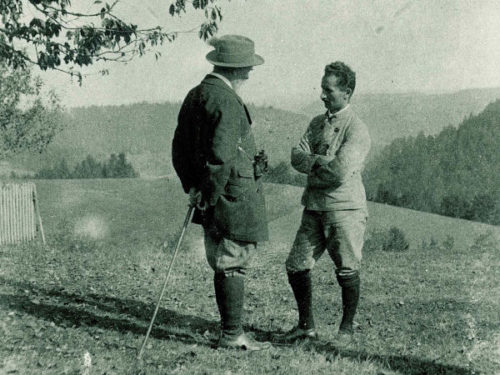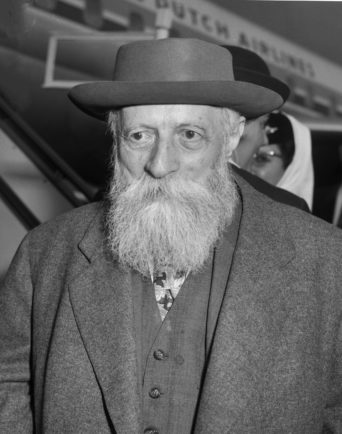
Sanlé Sory, photography (Burkino Faso, 1972)
“There is no meaning to the objective existence of an electron at some point in space, for example at one of the two holes, independent of actual observation. The electron seems to spring into existence as a real object only when we observe it!”
Heinz Pagels (Quoted by Paul Davies, The New Physics)
“The basic commitment is that the fundamental constituents of reality — perhaps electrons and quarks — have incredibly simple forms of experience.”
Phillip Goff (Galillo’s Error)
“What contemporary society still gives that is good and beautiful comes from its humanistic roots from an ancient, poor and religious world. But the consumer society is irreligious, and therefore arid.”
Pier Paolo Pasolini (Sincere interview with Pasolini on the world, art, Marxism 1968)
“Merely fact-minded sciences make merely fact-minded people. The change in public evaluation was unavoidable, especially after the war, and we know that it has gradually become a feeling of hostility among the younger generation. In our vital need—so we are told—this science has nothing to say to us. It excludes in principle precisely the questions which man, given over in our unhappy times to the most portentous upheavals, finds the most burning: questions of the meaning or meaninglessness of the whole of this human existence”
Edmund Husserl (The Crisis in European Sciences)
I wanted to write another post that sort of touches on these elusive ideas behind quantum theory. But that will necessarily lead to a discussion of the larger question of science in general, and then the inevitable and inescapable facts surrounding the erosion of meaning in life. Now John Gribbin has a nice book for lay readers of science on this topic of new physics (actually he has two) and toward the end he has a very useful paragraph about the problem of analogies.
“Analogies and modelling can even become completely circular processes, as happens when we try to explain the way atoms interact with one another in, for example, a crystal lattice. In such a crystal, the atoms are held in place by electromagnetic forces in a geometrical array. If one atom were to be displaced from its position, it would be pushed and pulled back into place by electromagnetic interactions involving its neighbours. A useful analogy is to imagine that all the atoms are joined to their immediate neighbours by little springs. If one atom is moved out of position, the electromagnetic forces act like imaginary springs, with the springs on one side being stretched, and so pulling the atom back into place, while the springs on the other side are compressed, and therefore push the atom back into place. We seem to have hit on a really good model of the electromagnetic force acting, under these circumstances, like a spring. But what is a spring? The most common everyday variety of spring is a piece of metal wire bent into a helical or spiral shape. In the spiral form, it may literally be a component of a clockwork mechanism, the physicists’ archetypal model of reality, which makes the analogy all the more appealing. When we push the spring, it pushes back; when we pull it, it pulls back. But why? It does so because it is made of atoms held together by electromagnetic forces! The forces we feel when we push and pull on a spring are electromagnetic forces. So when we say that the forces between atoms in a crystal are like little springs, what we are saying is that electromagnetic forces are like electromagnetic forces.”
John Gribbin (Schrodinger’s Kittens)

Jean Marc Bustamante
What Gribbin is saying is, essentially, that at the sub-atomic level of quantum theory the practice of describing the reality of this world that can’t be seen is very much one that relies on models. Everything is ‘like’ something else, something that CAN be seen. Waves are ‘like’ ripples in a pond when you throw a rock in. That is easy because in a sense we can see waves, or something rather close to waves. Its still deceptive to a degree, but when one gets to quarks and such, this modelling becomes dubious to say the least. Now western science was, for several centuries really, been in search of a ‘theory of everything’ (TOE). Alas, they have yet to come up with one. But Gribbin is keen to point out and question the subjective ‘choosing’ of models and by extension the focus of where (sic) to conduct experiments. In looking at the discovery of quarks, Gribbin is borrowing and following Andrew Pickering’s book (The Construction of Quarks).
“As Pickering points out, in a discipline like particle physics there is the perennial problem of background ‘noise’. There are other events going on that can mimic the kind of effects that the experimenters are trying to observe, and which have to be eliminated, if at all possible. This is just like the need to eliminate the background noise (or ‘static’) picked up by a radio receiver and to tune the receiver in accurately to the signal you want to hear – indeed, physicists refer to the property they are trying to investigate as the ‘signal’, just as
they refer to background interference as ‘noise’. It is impossible to eliminate every trace of noise, so again a subjective judgement has to be made about when the experiment is ‘good enough’ for the required purposes, and the remaining noise can be ignored.”
John Gribbin (Ibid)
That protons behave as if they were made of three quarks does not mean they ARE made of three quarks. But this is the point at which one must step back a moment and ask what reality means, or what truth means, in such a context. William Poundstone in his book Labyrinths of Reason, written in 1988, suggests that quarks are simply counterfactual. They are something that ‘might’ exist, IF protons could split into two — which they cant (apparently). Nobody has ever seen a quark. Ever recorded a quark. He asks, if quarks ‘may be artificial complications of a simple reality we do not yet understand’. The whole of physics at this point is made up of analogies and models for things that cannot be seen or recorded.

Odili Donald Odita
Murray Gell-Mann was the one of the two first theorists to posit quarks (and named them after a line in Finnegan’s Wake). Gell-Mann worked at Cal Tech at the time. He wrote a short two page paper that he actually was hesitant to publish at all. He felt the idea was so impossible. He said it made mathematical sense, but not much more. The other inventor was George Zweig, who also worked at Cal Tech for a while and later at CERN. He published his paper (calling quarks ‘aces’) and later lost an appointment to a major US university because the head of the department said his work was that of a charlatan. Later Richard Feynman created a procedure of testing that had a tradition behind it (see Rutherford bombarding atoms etc). There was a second theorist, James Bjorken, at Stanford, who approached the same procedure but from a purely mathematical manner. As Pickering said, it was very close to incomprehensible. Ergo Feynman became the name associated with a workable quark model. But here again, all physics at this level is analogy. Even the mathematical part. As Gribbin says, the new physics was the product of a culture.
“It is unproblematic that scientists produce accounts of the world that they find comprehensible: given their cultural resources, only singular incompetence could have prevented members of the [physics] community producing an understandable version of reality at any point in their history. And, given their extensive training in sophisticated mathematical techniques, the preponderance of mathematics in particle physicists’ accounts of reality is no more hard to explain than the fondness of ethnic groups for their native language.”
Andrew Pickering (Ibid)

Mary & Louise Wilson, photography/media (H-Bomb test site, Oxford Ness)
Ok, since I am not a mathematician (nor a scientist of any sort) my interest here is with the nature of analogy. And Gribbin points out a great example, ‘the big bang’ theory. The big bang rests on a logic that comes out of Einstein’s expanding universe theory (which in fact seems relatively factual since telescopes can see galaxies and stars moving ever further apart). But this leads one necessarily to this idea of a ‘singularity’. Another counter factual construct. Hence Stephen Hawking adjusted his math (in my short form version). He adjusted his idea of time. And time is a very elusive topic, in terms of physics (or philosophy).
“Setting aside the messiness of natural language, we might wonder about the status of scientific truth. If we speak an artificial, highly precise language such as mathematics or the logic of theoretical physics, is there a well-understood sense in which our statements are empirically true or false without being merely correct or incorrect, as in right or wrong relative to game-like stipulations? { } Moreover, while the relations between artificial symbols allow for rigorous precision, they’re game-like, too, because they’re detached from intuitions and from our capacity for understanding. Scientists understand what they’re talking about only when they translate the artificial language into a natural one and use analogies to simplify the exotic or abstract scientific concepts. The abstractions themselves proceed from axioms and rules of inference which are explicitly stipulative and therefore game-like, meaning that the scientific or mathematical inferences are correct or incorrect in the sense of cohering or not with the rest of the model. Those predictions may prove useful in the real world, in which case we say the model passes an empirical test. But scientists typically demur from speaking of that kind of model as “True” in a philosophical sense. They prefer to speak pragmatically and tentatively about the model’s utility because scientists know better than anyone the artificial language’s arbitrariness.”
Benjamin Cain (Is the Search for Truth a Game?)
And here we run into two related issues (or related questions or topics). One is the (so called) ‘hard problem’ of consciousness. The second is more about time, but as it relates to our life and death, and how that in turn relates to our idea of health (and by extension medicine, and science). More on this below. But to return to quantum science, Gribbin discusses some of Martin Krieger’s work and touches a very insightful (and potentially profound) observation:
“One of his insightful devices is to describe the workings of the subatomic world in terms of the workings of a factory, or of the economy of a country. An outsider, studying the way in which raw materials go into the factory and finished products emerge, cannot see the actual production process at work because it is hidden behind walls; but the observer can infer something about the production process by comparing the input and the output of the
factory.”
John Gribbin (Ibid)
I have written on this in terms of Fordism, and the shadow it casts on modern and post modern sensibility. The idea of efficiency, the search through your mental rolodex, etc. Here particles become like workers in a factory, with wage demands, strikes even, and so forth. One of the prevailing assumptions of physics is that everything is made up of smaller parts. Its a little like the clockwork model which is itself pervasive. Science is practised within a culture. It reproduces an ideology.

Mary Heilman
The quantum theories are useful examples of something Edmund Husserl wrote about at the very end of his life. His final (and never finished) book, The Crisis of European Sciences is stunningly prescient. (Crary mentions it, and I admit I was unaware of it). But the issues around quantum theory (and physics in general) are key in understanding the trajectory of the last six hundred years. Maybe more. But certainly this has been the time of a European world system (including colonialism and wholesale domination). A white supremacist system. And the role of the internet is critical in understanding the final stages of this deteriorating system and its economic twin Capitalism. But before getting into that, I think the quantum discussion also touches on what has happened psychically that has allowed this present crisis to reach the point we find it at today.
And this goes back to questions of technology. The internet however (and I think Crary is a bit deterministic about it, because the internet is not itself entirely evil or even entirely a technology of control). But rather it is the last act of the industrial revolution and the Enlightenment. Crary rightly quotes Bernard Stiegler who says
“As Bernard Stiegler and others have argued, the internet complex incarnates a specifically American model of technological consumption to which there has been little or no resistance in Europe and elsewhere, resulting in the liquidation of regional or national cultures. For Stiegler, one of the innovations exported by the US is technology for “the mass production of behavior” and for a hyper-synchronization of consciousness which has led to “the decomposition of the social as such.”
McLuhan knew this too, but McLuhan had somewhat conservative politics. He also wrote over forty years ago.

Edmund Husserl (l) with student Martin Heidegger (r).
“But now, as a constitutive component of twenty-first-century capitalism, the internet’s key functions include the disabling of memory and the absorption of lived temporalities, not ending history but rendering it unreal and incomprehensible.”
Jonathan Crary (Scorched Earth)
The first page of Elena Pulcini’s excellent book on contemporary subjectivity, she writes….
“The birth of the modern Self appears characterized by a constitutive ambivalence between sovereignty and deficiency, desire for self-assertion and sense of uprooting, and conquest and loss. The decline of theological-metaphysical fundaments causes that “loss of order” in which Hans Blumenberg sums up the very preconditions for the genesis of the modern age and throws the individual into dual disorder: the external disorder of a “disenchanted” and secularized world no longer supported by cosmic ties and hierarchical rules, and the internal disorder of the emotional life, which takes on unprecedented importance and legitimacy, but at the same time unveils itself in all its uncanny truth. The individual discovers that he is free, authorized to invent his own life plan, to explore a boundless reality upon which he can cast his “curious” gaze, laden with expectations.”
Elena Pulcini (The Individual Without Passions)
In quantum theory, or one theory from a quantum mechanics theorist, there are two kinds of causality in the world; strong and weak. The strong is the one we know in the classical Newtonian world. The second is one that is pure speculation and suggests the time can travel backwards (if we just look at that way).
“At first sight, it might seem as if everything is fixed by these communications between the past and the future. Every photon that is emitted already ‘knows’ when and where it is going to be absorbed; every quantum probability wave, slipping at the speed of light through the slits in the experiment with two holes, already ‘knows’ what kind of detector is waiting for it on the other side. We are back with the image of a frozen Universe, viewed from the perspective of a photon, in which neither time nor space has any meaning, and everything that ever was or ever will be just is.”
John Gribbin (Ibid)

José Manuel Rodrigues, photography.
It is interesting that Pulcini devotes a good deal of time to Montaigne. For I think one of the ways to create abilities of resistance is in reading. Reading and writing.
“Writing is an act of self-assertion through which the Moi exercises the right to find in himself alone the axis, the Archimedean point around which an existence no longer bound by transcendent authorities, hierarchical codes or collective structures can revolve. The Self responds to the decline of the cosmic order in which the Renaissance individual still found the firm preconditions for asserting his dignity through the absolute and provocative mise-en-scène of his own solitude, determined to take himself as his own metaphysic.”
Elena Pulcini (Ibid)
The reality today of a world largely controlled by people such as Jeff Bezos or Bill Gates (and his thirty visits to Epstein’s island) is one that needs to be understood with some historical perspective but also with a deeper investigation into the human psyche. Imagine if you had Bezos money. What would you do ? If you made billions of dollars every day. Make a spaceship and fly sort of into space? For five minutes? I mean if Bezos gave away 80% of his wealth he would still be among the richest people in the world. Of course if he tried to give it away he would be murdered. But as a thought experiment, I can imagine so many people that it would give me pleasure to help. So many causes and countries and political projects. But Bezos wants to keep his money. And so does Gates. They want to be Gods, from all I can tell. But my sense is that the kind of god they want to be is a paltry malignant god, a destroyer of life and not the creator of life.
“Excepting thee, O man . . . everything studies itself first, and has bounds to its labours and desires, according to its need. There is nothing so empty and necessitous as thou, who embracest the universe; thou art the explorator without knowledge; the magistrate without jurisdiction: and, after all, the fool of the farce.”
Michel de Montaigne (The Essays)

McArthur Binion
Back to the psyche, then. What Martin Krieger said about physics many years ago, now, is relevant here, too. Psychology is, rather obviously, the product of the culture in which it exists. Today, with the rise of electronic media there has been a blurring of scholarly work with click bait. Pop psychology is everywhere, and mostly in a sort of ersatz self-help presentation. “How self centered friends can ruin your life” is one title I saw recently. There was very close to zero content in that article. There are thousands like that. They are churned out by various online sites with usually a thousand ads and drop downs and pop ups etc etc etc. Its the intellectual version of empty calories. But really its much worse than that. Its the intellectual equivalent of eating asbestos or drinking anti-freeze.
Today’s idea of Nature is one that can be traced back to the 16th century. At least in the sense of Europe’s ideological development. The Industrial Revolution marked an intense escalation of technology and of ideological intransigence.
“…capital must begin by planning for the comprehensive destruction and annihilation of all the non-capitalist social units which obstruct its development.”
Rosa Luxemburg (Rosa Luxemburg Reader, quoted by Crary)
In one sense this is the ideological and propagandistic role of pop psychology. The intellectual impoverishment of the population is a necessary feature of annihilating any alternative political or social project. Socialism/communism is at the top of the list. This is relatively obvious stuff, however. I suspect the majority of the populations of Europe recognize there is a war being waged against them. The problem is the overwhelming power of the state apparatus. Much of the domination of global populations took place while marketing and advertising, propaganda overall, was deceiving the people and now as they are waking up (as it were) control and power has been more securely entrenched than ever before in history. This is not to say that even the skeptical have not been affected. Everyone has been affected.
Embedded within the Enlightenment was the idea of, not just progress, but like Capitalism needing to destroy all non capitalist forces, but of a progress that functioned like a sterile laboratory. The perfect world was envisioned, tacitly or overtly, as a lab. The emphasis on solutions was one that did not question if the results found in the lab might not work outside the lab. Better to just make the world outside the lab exactly like the lab. No other world was acceptable. The real world would have to be destroyed.

Lewis Baltz, photography.
“Now, amid intensifying social and environmental breakdown, there is a growing realization that daily life overshadowed on every level by the internet complex has crossed a threshold of irreparability and toxicity. More and more people know or sense this, as they silently experience its damaging consequences. The digital tools and services used by people everywhere are subordinated to the power of transnational corporations, intelligence agencies, criminal cartels, and a sociopathic billionaire elite. ”
Jonathan Crary (Ibid)
Crary notes the rise of ‘presentism’ in the 1990s. This was a hype campaign, in a sense, that promised everything was there on command — or demand. This ran alongside the advance of ‘risk management’ , forecasts, simulations etc. This was also the sort of delusion that privileged ‘game theory’ as a serious branch of science or math (or philosophy, who knows). Crary rightly notes this is nothing new, really. Capitalism has always sought to minimize risk and control outcomes. The highest virtue of capitalist thinking is the ‘rigged game’. Aligned with ‘presentism’ came the valuation of speed for its own sake. And (per Crary) the advent of ‘5G’ is the ultimate pointless exercise of fast ‘communication’ bereft of content. But the point here, and I quote Crary, is…“the dispossession of thought, and the evaporation of what used to be understood as interiority and volition.”
Federico Campagna calls the present historical moment ‘metaphysical nihilism’. His metaphor of the stage is very telling even if not quite correct. I have written a lot about the ‘off stage’, the place where the ‘real’ action of the play takes place. It is, in a sense, the unconscious of the play. And Campagna is correct to suggest (or my interpretation and correction ) that this era of computational capitalism is one that seeks to colonize the ‘off-stage’.
“At a superficial reading, our fear of extinction might appear merely as the product of the imbalances and unsustainability of the system of production and consumption that is in place at present. But in fact, the spread and grip of the fear of extinction over our collective minds, reveals a profound conceptual continuity with the very reality-system enforced by Technic.”
Federico Campagna (Technic and Magic)
This is very interesting, and I think this apocalyptic fear that seems everywhere today is worth examining. I am not one who accepts the prevailing extinction narratives about man made global warming. I have not seen any convincing evidence it’s man made — but what I do see is a hugely significant crisis of pollution and of capitalism. I see the largest industry in the world is ‘Defense’. Second is pornography and third is packaging (last I looked). Yet environmentalists rarely mention the war machine. Many support the US/NATO proxy war in Ukraine. With that pollution comes an utter inability of the ruling class of psychopathic billionaires and their state agents to solve the coming social unrest. The Great Reset is the most visible project, though clearly lurking behind it is a more nightmarish project of de-populating much of the planet’s ‘surplus populations’ (the global poor). Whether the vaccine mandates have anything to do with this is an open question but its certainly a question that needs asking. The earth may well be getting warmer, but its increasingly difficult to separate the facts from the propaganda. But in any case the criticisms of what is called ‘post Fordism’ increasingly feel unable to find their way out of their own culture, as it were. The imagination of even the best are caught in the language and perhaps even the unconscious of , what I am calling, the post-Enlightenment. Firstly, I’m not sure Fordism is gone at all. I think the residue if not the flesh of Fordism is still very present.

Jusepe de Ribera (St Peter. Detail. 1612)
“At the basis of the contemporary obsessions with so-called ‘Big Data’ ” lies the double ontological assumption that: (1) the language of information technology is capable of grasping the whole of the existent; (2) more extremely, the whole of the existent coincides with the reach of the language of information technology. The record-shattering investments in Big-Data systems and technology rest on the belief that there can’t possibly be anything ontologically relevant that couldn’t, at least potentially, be reduced (and reduced truthfully) to the serial units of the language of data. Similarly, through substituting the terms ‘information technology’ with ‘finance’, we can understand the contemporary role played by financial capitalism, not merely as a translator of the world into its own linguistic structure, but as the creator of a world that coincides exactly with such structure.”
Federico Campagna (Ibid)
The apocaplytic fear is a response to the sense or feeling, often subtle, of the loss of purchase on reality. The substitution of environmental fear serves to salve the existential terror underneath it.
Campagna makes an astute observation, though, about technical language, or grammar, when he says:
“Neuroscientific language presents itself as valid and trustworthy, because: (1) it can at least potentially grasp in an exhaustive fashion the whole of the object of its research; (2) more extremely, there is no emotion, feeling, thought-process and so on, apart from those that are already contained, however potentially, within the linguistic system of neuroscience itself. Functioning as a form of scientific sentimentalism, neuroscientific metaphysics claims that mental processes that can’t even potentially fit within its language are nothing but mere fantasies or superstitions.”
Federico Campagna (Ibid)

Uwe Wittwer
The point about the loss of emotion and feeling is significant. This is the world-as-lab again. And it is exactly a kind of scientific sentimentalism (which one sees in quantum theory, too). A near cultic belief in science prevades the contemporary sensibility, but its a science that either (per Campagna) decides what it cannot explain is mere illusion, or it admits it has no idea how its theories work, as long as they work (quantum mechanics), and often we have only their word for that. Which will lead me to a few remarks on medicine below. But before that, Franco Beradi makes an observation (quoted by Campagna) that today children learn more vocabulary from a machine than from their mothers. Language is being learnt dissociated from bodily experience. Just another aspect of the existential unease running through the contemporary world.
“Science, in its many powerful institutional manifestations, is now essentialized as an a priori source of truth, existing above economic interests or social determinations and exempt from historical or ideological evaluation. It is the one remaining mirage of legitimacy behind which global capital continues its rampage of planetary looting and destruction. The marginal figures of the altruistic climatologist or oceanographer are foregrounded as camouflage for the structural complicity of most scientific research with corporate and military priorities.”
Jonathan Crary (Ibid)

Martin Buber, 1963.
This sense of incompleteness is linked at its most foundational level with the loss of the body — by which I mean the loss of a certainty that ‘I’ exist. Call it unreality. All the biometrics that surveil and monitor our movement and behavior, also, tacitly, are recreating an ideology. The system is presenting a vision of humankind that is characterless, bloodless, and without desire. Except, of course, humans still desire. In their unconscious at the very least people feel sexual and erotic urges. But they are purposefully channeled into pornography or prostitution. Its not an accident that all the internet policing never touch porn. Pornography is essential as a release valve of sorts for the frustrations and longings of the masses. It is rarely even talked about by critics of this new eco-capitalist project. The sibling of porn is ‘entertainment’. And Hollywood deserves a special seat in the inner circle of hell for its compliance with the new crypto fascist state. The third part of the state’s ideological triage is the smart phone. Is internet tech.
One other thing about technologies like facial recognition is that they are positing, by default, a facial template (if not ideal) that is without the subtle but intractable traces of suffering that humans endure. The machine recognizes certain things, but not interior individuality; an individuality born of hardship, courage, and endurance. If you look at Hollywood’s leading men today you see versions of this facial recognition template (Ryan Gosling, or Henry Cavil, or Ryan Reynolds et al). As an almost sidebar here, I was pleased to see Crary mention Martin Buber favourably. When I was first in NYC, about twenty years old, and working as a dishwasher, one of the writers that kept me sane was Martin Buber. I remember my old mentor Ork expressing surprise at this, but in an interested way. I had trouble explaining it, but Buber was clarity itself. He was a kind of Zen teacher in a sense, and his voice was with me for all of one summer, I remember. His notion of I-it is one of the best descriptions of how reification occupies out interior lives.
“We are losing the possibility of listening; of facing, with forbearance, a stranger, someone destitute, someone who offers nothing to our self-interest. ”
Jonathan Crary (Ibid)

Kathleen Petyarre
The erosion of the service industry (now largely automated) has left people increasingly uneasy with meeting, let alone speaking with, a stranger. Murray Mednick and I once wanted to title a book on theatre we were thinking of writing, “Failure to Listen“. Those working in theatre had noticed forty years ago that audiences has stopped deep listening.
The existential terror beneath all the other crises is, finally, the loss of reality. And perhaps it is better to say the destruction of reality. I find that art remains the last bastion of the real. Not just the experience of looking at a Van Eyck or Giotto or DeKooning, or listening to Webern, Coltrane, Professor Longhair, or Beethoven, but in *reading* criticism. Reading John Berger, T.J. Clark, or Tarfuri, Ruskin or Bly, is to be reacquainted with mysteries of existence. You cannot write about painting, for example, if you are in the least serious, and not find questions of mortality, of life’s meaning or lack thereof. The ascension of entertainment has done to art what porn does to desire.
“The passion for gain represents, as we shall now see, the emotional core of homo oeconomicus who, starting with Locke and the enhancement of the proprietor individual, is configured as the universally recognized paradigm of modern individualism.”
Elena Pulcini (Ibid)
Allow me one more excerpt from Crary (really from Adorno, who he quotes)….“In the 1960s, Theodor Adorno profiled the technophile as a pathological manipulator: those who fetishize technology, he said, are “the cold ones” who have never known love, joy, or empathy. “This is not meant to be sentimental or moralistic but rather describes a deficient libidinal relation to other persons. These people are thoroughly cold; deep within themselves they must deny the possibility of love, must withdraw their love from other people before it can even unfold. And whatever of the ability to love somehow survives in them they must expend on devices.” Adorno noted that the dominant powers in “each epoch produces those personalities it needs societally.”
Each epoch produces the character traits necessary for the interests and goals of the ruling class. Madison Avenue grasped early the need to eroticize nerds. But they also saw the need to make heroic the bureaucratic functionary (insurance salesman as stud and hero). Hollywood began this in the 70s. But then Hollywood producers by that time were themselves bloodless nerds. There is also, beginning in the sixties, an explosion of drug use. This is an enormous topic but it expresses a certain malaise in the society. The counterculture tolerated and often championed drug experimentation because it was part of a rearguard action against conformity. But deep down the counterculture knew the nerds were winning. Artists like R. Crumb saw the coming endgame for capitalism, and left the US. Crumb saw in his brother’s madness a symbol of all that was wrong with corporate conformism and the business culture. William Burroughs, too. But the seventies also saw the front edges of a growing reactionary (faux) avant-garde. Robert Mapplethorpe was a part of this. Patti Smith certainly was. The millionaires of rock are now hosting golf tournaments and doing benefit concerts to help the US/NATO war on Russia. Rock for Ukraine. These ‘scenes’ overlapped, certainly. Sam Shepard collaborated with Patti Smith, and much as I loved him and admired his work, he also went to Hollywood and made fascist movies. The system was digesting its artistic children. By the 80s and on into the 90s the fault lines were more clearly drawn. It also bears mentioning the Clinton crime bill and War on Drugs. The State Department and criminal justice system were synched and they intensified their war on the poor.
“In the long run a malaise arises from not being sick in a world where there are sick men. And what if this were not because one is stronger than the disease or stronger than others, but simply because the occasion has not presented itself? And what if, in the end, when the occasion does arise, one were to show oneself as weak, as unprepared as, or perhaps more so than others? Thus there arises in the normal man an anxiety about having remained normal, a need for disease as a test of health, that is, as its proof, an unconscious search for disease, a provocation of it. Normal man’s disease is the appearance of a fault in his biological confidence in himself.”
George Canguillhem (The Normal and the Pathological)

Jesus Perea
The apocalyptic fear of the moment is given a natural pathway –environmental destruction, and global warming. Even if this were entirely true, entirely as advertised, the underlying terror remains and the underlying terror is about reality itself. As Campagna notes, the fear is conceptually congruent with the language and structure of financial capitalism, of electronic algorithmic platforms. In other words the resistance to this destruction of humanness must be found in aesthetic resistance, in the reclamation of meaning in life. It is hardly surprising that there is a massive propaganda campaign to sell people on having babies in artificial wombs (if you HAVE to have a baby, which is discouraged despite plummeting reproduction numbers). Other people are now a threat to one’s health. As Canguillhem noted in his postscript (twenty years after the book was published) there is an unconscious search for disease today. Disease is there to have a war launched against it…for everything is warred against. It is the sign of health. The language changed some thirty years ago when you began to hear so and so is ‘battling’ his cancer. Of course there was also the sentimentalizing of same with he or she is ‘living with cancer’, when what was meant was he or she is DYING of cancer. But this leads us back further, still. To the famous ‘denial of death’. One of the subterranean themes in cyber domination is that it feels as if you cannot die. This maybe began with film technology, where the movie star never ages. Technology itself may be complicit in this refusal to admit mortality.
Which takes me back to Campagna again. One of the points of his book, perhaps THEE point, is that what he calls ‘magic’ is both an alterity to western science and positivist thinking, but also its therapy. He touches on early Islamic thought, on Indian philosophy and Buddhism.

Young Jeff Bezos on Halloween.
“The question of existence and essence has animated the philosophical and theological debate since time immemorial – arguably, though using a different vocabulary, since the composition of the Upanishads around the eighth century BCE, all the way to the latest developments in Anglo-American analytic philosophy. For the greatest part, the Western approach to this issue has orbited around purely metaphysical concerns, that is, around the attempt to discover the ‘truth’ about the matter – however one is to understand the notion of ‘truth’ as such. Even when it entered an eminently theological realm (as for example in the medieval dispute between the positions of Thomas Aquinas and of Duns Scotus), the Western line of enquiry sought a notion of ‘objectivity’ that wished to purify as much as possible philosophical enquiry from the distortions produced by an all-too-human, existential framework.”
Federico Campagna (Ibid)
The quantum theorists who struggle to explain why their experiments ‘work’, and hence they struggle to imagine the future of these ideas, or where (sic) these theories lead. Everything is made up of smaller things. But philosophy has always, really, distrusted a reliance on objectivity. Perhaps there lurked an intuition that consciousness itself was not amendable to objective description. Or, amendable to exploitation.
“Although several forms of magic (let us think of the Kabbalah, for example), saw in the ‘word’ the prime object both of their practice and of cosmogony at large, we should not assume that their understanding of the term ‘word’ coincides with the common notion nowadays. In an age such as ours, governed as it is by the principle of total language, any semantic sign denotes merely a position in a series. Their function is allegorical, in that they are deemed capable of conveying precisely and entirely the object of their signification – which ultimately coincides with the position itself. This allegorical exhaustion and precision is a fundamental aspect of Technic’s cosmology, and it has seeped into our everyday experience since the times of modernity – or, to say it with the philosopher of science Alexander Koyré: since the passage from the world of the ‘more-or-less’ to the universe of ‘precision’.”
Federico Campagna (Ibid)

1960 office. Photographer unknown.
I often find myself wondering how Wittgenstein would discuss quantum theory. In any case, this is also why I so often return to psychoanalytic investigation or commentary. I feel we cannot escape psychoanalysis. Many Marxists I know dislike Freud and even the socialist minded early members of the Vienna Circle. But psychoanalysis IS amenable to aesthetic resistance.
The hard question of consciousness (sic) remains real, but sometimes I do wonder if the location aspect isn’t being overcompensated for. If you have ever been knocked out (I have, twice, once in the ring and once on the street) it is always from a blow to the head. I never got knocked out from getting punched to the kidney. (though I think Sonny Liston once knocked a guy out hitting him the chest). I digress. The primacy of the *word* in nearly all mystic traditions is also found, as a form of re-enchantment (to be very Readers’s Digest version here) in Benjamin and Wittgenstein both.
“There is no event or thing in either animate or inanimate nature that does not in some way partake of language, for it is in the nature of all to communicate their meanings. This use of the word “language” is in no way metaphorical. For to think that we cannot imagine anything that does not communicate its spiritual nature in its expression is entirely meaningful; the greater or lesser degree of consciousness that is apparently (or really) involved in such communication cannot alter the fact that we cannot imagine a total absence of language in anything.”
Walter Benjamin (Collected Writings, Gesammelte Schriften, vol 7)

Naum Gabo
Benjamin saw language as translating the world. The meaning of the world was translated into a language. And meaning is, at its core, a mimetic relationship with Nature.
“Language may be seen as the highest level of mimetic behavior and the most completearchive of nonsensuous similarity: a medium into which the earlier powers of mimetic production and comprehension have passed without residue, to the point where they have liquidated those of magic.”
Walter Benjamin (On the Mimetic Faculty, 1933)
Campagna is looking for a corrective to western science — at least as one finds it today. Writers like Bernard Stiegler are doing the same. Even Agamben is searching for a way out of this metaphysical trauma. Campagna quotes Ibn Arabi (12th century Sufi philosopher) and draws on Vedanta and Islamic mysticism. And there is a sense that this debate is the same debate, really, that quantum theorists are having. But with different priorities. And it is, really, the same debate Benjamin was having with Gershom Scholem. It is about the ineffable.
“The Absolute and the world are bound to each other in an endless process of reciprocal ‘constriction’ (taskhir): just as the world is entirely dependent on the Absolute in terms of its existence (of which the Absolute is the ultimate source and ground), so the Absolute, via the permanent archetypes of its Divine Names, depends on the world for its self-manifestation.”
Federico Campagna (Ibid)
The ineffable is that in which humanness is grounded. And it is that which Capitalism destroys. It is that which instrumental thinking and language seeks to render illusory. Children are born with it and they cling to it for as long as they can. Watching it finally wither and disappear is one of life’s tragedies. The role of artists is to refuse its marginalization. If the ‘off stage’ is being colonized, the result will be strip malls in the collective unconscious of humankind. There will be open pit mining where dreams once were. There will be Bradley Fighting Vehicles where once there was Dionysian eroticism and abandon.
to donate to this blog (and to the Aesthetic Resistance podcasts) use the paypal button at the top.

Speak Your Mind